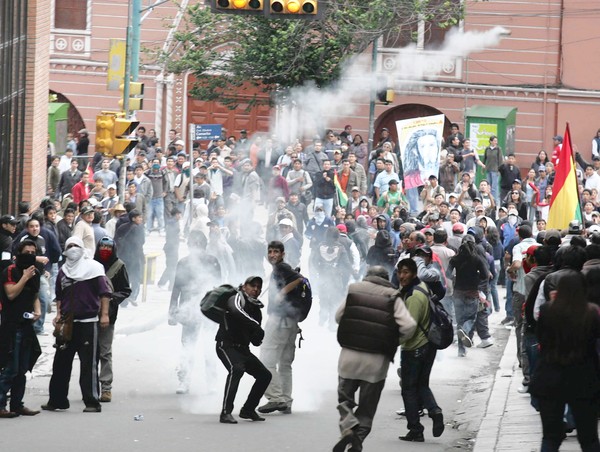 (above) Demonstrators in La Paz, the Bolivian capital, protest steep increases to fuel prices after President Evo Morales slashed subsidies. (Photo: Javier Mamani, EPA / December 30, 2010)
(above) Demonstrators in La Paz, the Bolivian capital, protest steep increases to fuel prices after President Evo Morales slashed subsidies. (Photo: Javier Mamani, EPA / December 30, 2010)
Bolivia leader restores fuel subsidies in the face of protests
January 1, 2011 - Los Angeles Times
President Evo Morales backs down after an unsuccessful appeal to his power base to support gasoline, diesel and jet fuel subsidy cuts. The nation had been bracing for more strikes and protests.
By Chris Kraul, Los Angeles Times
Reporting from Bogota, Colombia --- Faced with mounting political opposition and the specter of crippling strikes, Bolivian President Evo Morales late Friday night reversed his recent decision to slash gasoline and diesel subsidies, a move that led to a near-doubling of fuel costs.
Morales called a New Year's Eve news conference to say he wanted to spare the nation further upheaval after a week of protests that turned violent Thursday. The nation had been bracing for a strike and demonstration Monday by powerful miners unions.
Morales' backtracking followed an unsuccessful appeal to his power base to support his Dec. 26 decree sharply reducing subsidies for gasoline, diesel and jet fuel. On Friday, he sent Vice President Alvaro Garcia Linera to talk to coca growers, a group Morales once led, after they blocked a main highway from Cochabamba to Santa Cruz.
Morales had said Sunday that he was cutting fuel subsidies to save $380 million and to choke off the sale of low-cost Bolivian fuels at a big profit on the black market in Chile, Peru and Brazil. The decree, which caused prices of gasoline and diesel to rise 73% and 83%, respectively, sparked the widest protests since he was inaugurated in 2006.
For reasons he did not explain, Morales did not reduce heavy subsidies on liquid propane gas, used for heating and cooking. He may have been mindful of protests that erupted in 2003 after President Gonzalo Sanchez de Lozada raised propane gas prices. Those protests subsequently helped drive Sanchez de Lozada from office and opened the path for Morales' election in 2005.
On Thursday, thousands of demonstrators marched in several cities and threw rocks at government buildings in La Paz, the capital, where police used tear gas to disperse crowds. Taxi drivers called a strike that brought commerce to a standstill in the capital. The government reported that 15 police officers nationwide were injured.
He had been facing a real test of public sentiment in the new year, when schools and universities return to session and workers are back on the job after the holidays, said Lupe Andrade, a La Paz-based political consultant and former mayor of the capital. The decree ended a six-year freeze on gasoline, diesel and jet fuel prices.
Andrade said of the earlier decree: "The announcement came as a complete surprise, especially given that the president has touted the economy as among the most vibrant in the region with energy reserves among the highest of any country in South America. Everyone is perplexed."
After Morales announced Friday night that he was canceling the subsidy cuts, Andrade said the leader's problems may not be over: Many business groups were eager to use the rise in fuel costs as an excuse to raise prices.
"The measure was badly planned and implemented, but this hasty retreat is even worse," she said.
She said that energy industry sources believe Morales had ended the subsidies in response to a sharp decline in private investment in YPFB, the state-controlled oil and gas company.
Although Andrade and other analysts expect Morales to weather the storm, the president's approval rating, which according to one pollster had already fallen from 70% in January to 52% in November, had slipped further. His image took a hit after he kicked an opponent in a soccer match in October, images of which aired on YouTube.
Fuel prices have proved to be a sensitive political issue in some of Latin America's oil- and gas-producing countries, where residents feel entitled to subsidies. In 1989, an attempt by Venezuela's then-president, Carlos Andres Perez, to raise gasoline prices set off violent protests that left hundreds dead.
To defuse the protests, Morales had promised to use the savings from reducing subsidies to support grain farmers in a program that he said could lead to lower consumer prices. He also announced 20% wage increases for teachers, health workers, police and the armed forces.
But some workers weren't mollified, with the bus drivers union calling for a nationwide strike Thursday. Miners and other large unions are planning protest marches Monday in La Paz.
Morales on Friday ordered the army to sell bread in parts of La Paz and in El Alto, a poor suburb, after a bakers union declared a two-day strike to protest higher fuel costs. The bread will be produced in government ovens and sold at 10 sites staffed by troops.
Kraul is a special correspondent.